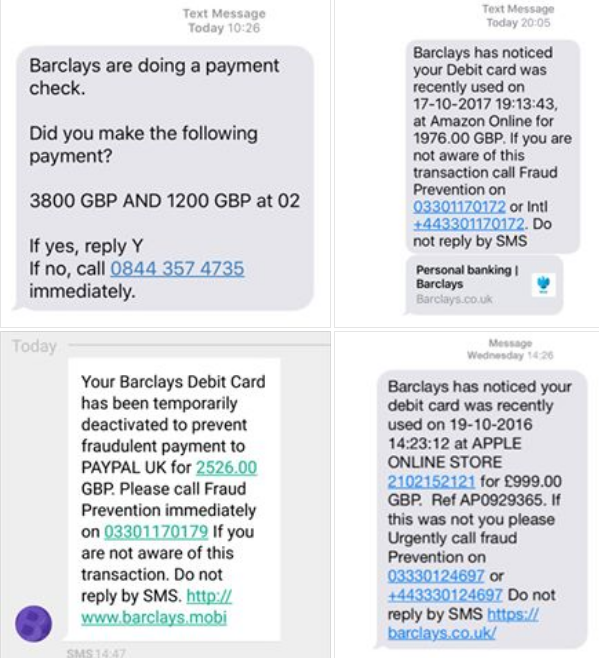Don't fall for this text scam posing as Barclays bank that could hijack your passwords
Barclays: "If you have received any of these texts or similar - do not respond."

Barclays bank has warned customers about a rise in text-based scams attempting to steal personal details, urging anyone who responded to the fraudsters to get in contact.
In a Facebook update Tuesday (21 November), it posted screenshots of the scams. In most cases, the scammers were claiming that suspicious activity had been spotted on accounts.
One fake text read: "Barclays are doing a payment check (sic). Did you make the following payment? If yes, reply Y. If no call [the illicit number] immediately."
An online check of the number revealed several complaints from people who had called it in the past.
"Fraud definitely, they will try to get all your log in details," one person complained on 17 November. Another added: "Called Barclays and this is a scam."
On Facebook, the bank wrote: "If you have received any of these texts or similar - do not respond.
"They are not from us. If you have responded, please contact us immediately."
Barclays does send out text alerts to its customers asking them to confirm transactions using 'Y' or 'N' replies. But it warned the scam messages are using non-Barclays phone numbers.
"Fraudsters can use fake numbers that look like Barclays numbers to hide their true identity," a spokesperson for the bank told The Sun in a statement Wednesday (22 November).
"If customers are unsure about a call or text they have received we would encourage they use our number checker to make sure it's genuine and then enter the number manually on their phone."
On its website, the bank offered tips to ensure its users stay safe online:
- Never give out your PINsentry codes, Mobile PINsentry codes, passcodes or passwords to anyone – even a caller claiming to be from the police or your bank.
- Don't click on any link or open any attachments from an unsolicited email.
- Avoid letting someone you don't know have access to your computer, especially remotely.
Action Fraud, the UK's online watchdog, tweeted a link to Barclays' own number-checker system, which any concerned customers can use to ensure a banking alert is legitimate.
It warned the aim of text-based phishing – or smishing – scams is to dupe victims into handing over banking details or call premium-rate numbers they have created to rack up a large bill.
The watchdog said: "Phishing and smishing are done in many different ways. In the end, the aim is always to trick you into thinking you're giving up personal information or making payments with someone you can trust, such as your bank, a government agency or a business."























